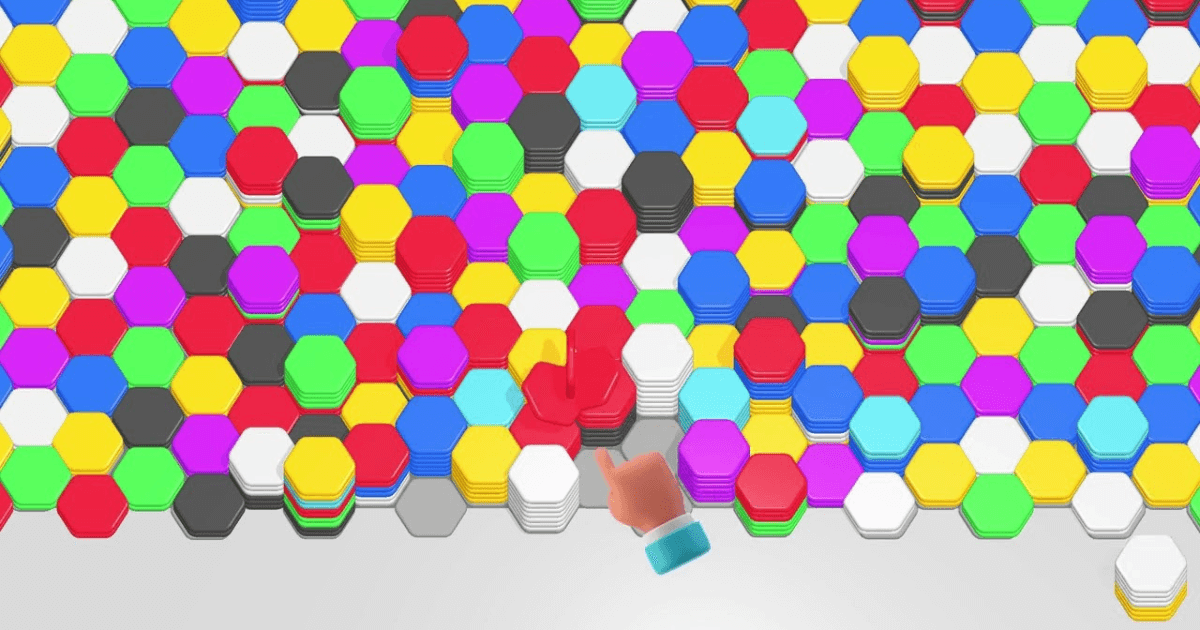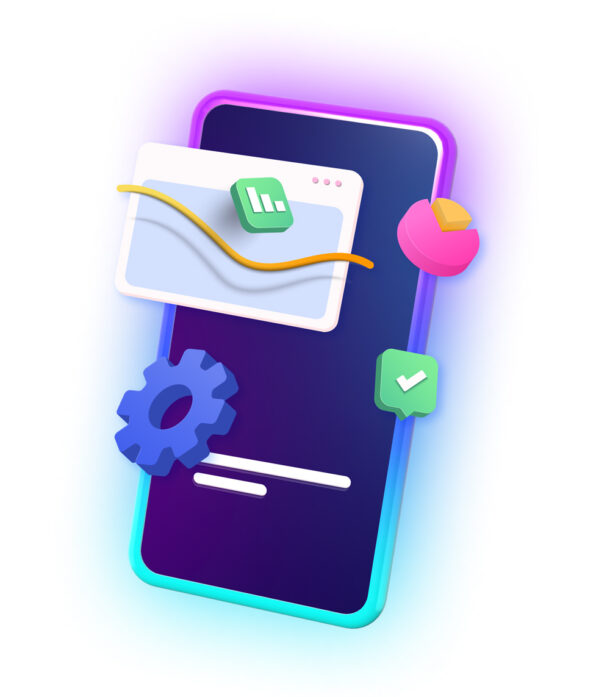Fake Google Play reviews are quite a problem.
Even though Google has made multiple attempts to get rid of them, phony reviews are still a burning issue.
To make things worse, they are becoming less and less obvious.
To try and prevent this, Google has introduced a 24-hour delay for app reviews. This is just one of Google Play’s recent policy updates.
How big is the fake review problem? What does this update mean for developers? Can it also help in fighting review bombing?
We have the answers.
About Fake Google Play Reviews
Reviews in the app stores play a big role in the success of mobile apps. They help users decide whether to install them or not, but also assist developers in improving their apps.
But, only if they are genuine and constructive.
Unfortunately, the app stores are filled with fake, misleading reviews.
Why is that?
Well, some developers cross over to the dark side to try and make their app look better. In other words, they purchase positive reviews.
As a result, you can see a flood of 5-star reviews saying things like “Great app”, or “Amazing app”. Yet, they actually don’t say a lot about the app.
Just like you can purchase positive reviews, you can do the same with negative ones.
If you notice that your app suddenly got a lot of reviews like “Do NOT install this app”, it’s possible that one of your competitors is behind this.
How Can You Spot Fake Reviews?
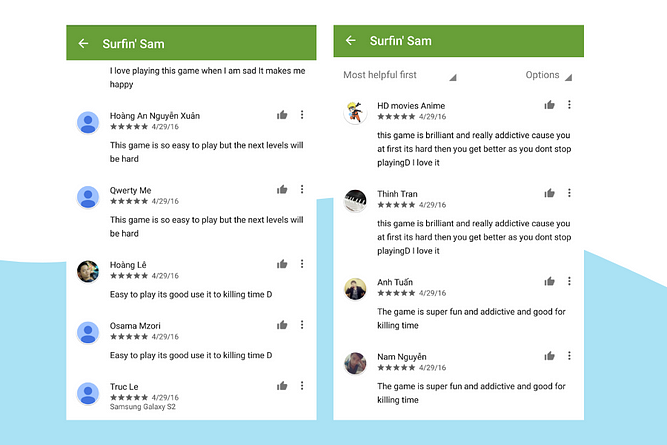
Identical, fake Google Play reviews posted on the same day by different users. Source: Reddit
Good or bad, fake Google Play reviews are frequently written by bots.
For this reason, they are usually not very convincing. If you carefully read through them, you should be able to tell them apart from real reviews. Here are some characteristics that give them away:
- A big number of 5-star or 1-star reviews that appear on the same day
- Identical reviews, but posted by different users
- Reviews that follow a similar sentence structure, with slightly different wording
- They are usually general and don’t explain what exactly makes the app good/bad
- Poor grammar
- Reviews that simply don’t make sense (e.g. “It’s a fun game” for a non-gaming app)
One of the biggest problems with fake Google Play reviews is that they are getting more and more sophisticated.
There are even companies that have real people write reviews in different languages.
Not only are they grammatically correct, but they use smart tricks to get around the algorithm. For example, they give both 4 and 5-star ratings and don’t appear all at once.
Recognizing such reviews is a big challenge, both for Google and the developers.
Review Bombing
Fake reviews by fake users are just one part of Google’s review problems.
In the last couple of years, there has been a lot of talk about review bombing.
Review bombing is a practice where real users team up to leave negative reviews, as some sort of a protest.
It’s like organized crime against apps.
Most of the review bombing cases aren’t even related to the app experience. The users that leave such reviews are frequently motivated by ideological differences, disapproval of the developer’s moves, or something else.
For example, a lack of will for studying.
Google Classroom
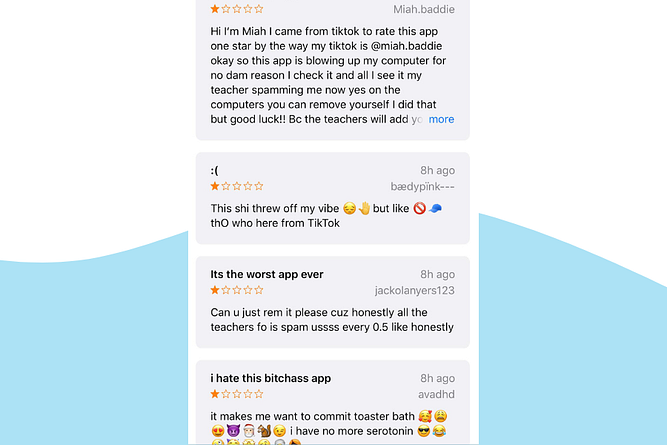
In April 2020, schools closed their doors, and a lot of students switched to remote learning through the Google Classroom app.
Then, someone on TikTok made a video convincing students that they can take the app down by bombing it with bad reviews. This became viral and the app’s ratings soon dropped to 1.6.
However, unfortunately for the students, their plan to dodge homework and chores didn’t work out.
Genshin Impact
Hardcore mobile gamers are a tough crowd to please. So if they get angry, things can quickly go south.
In September 2021, Genshin Impact celebrated its 1st anniversary and prepared free premium content for its players. However, its players were very unhappy with the rewards, so they expressed their anger through review bombing.
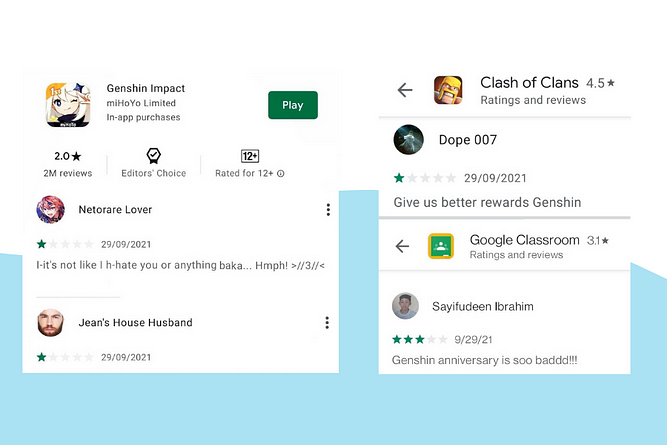
At one point, the game’s rating sank to 1.9. To make things even worse, they attacked other MiHoYo apps, as well as completely unrelated apps like Clash of Clans and Google Classroom.
How Does the New Update Affect Fake Reviews and Review Bombing?
Over time, Google made multiple attempts to get rid of fake reviews and review bombing.
In 2018, the company developed a new system that helped spot and delete millions of fake reviews. Since then, Google has improved its ability to recognize such reviews before they cause serious damage.
However, it obviously wasn’t good enough.
To combat this, Google is putting an end to leaving real-time reviews. With the new update, reviews will become visible 24 hours after the submission.
Even though they won’t be publicly visible, the developers will be able to see and respond to them right away.
The point?
It’s pretty straightforward.
This gives Google and the developers more time to recognize and react to suspicious activities.
What Does This Mean For Developers?
With this update, Google is attacking fake reviews from two fronts.
The first one is its algorithm, and the second one is the developers themselves.
Since the developers see reviews as soon they are submitted, they gain a small advantage.
While the reviews are on a 24-hour hold, they can report fake Google Play reviews, and stop them from appearing in their app listing.
It also helps with other, non-fake reviews.
The delay allows developers to plan ahead, make improvements and come up with the perfect response. As you probably know, it’s recommended to always respond to reviews, positive or negative.
It is especially important to tackle negative ones.
Ideally, by offering some kind of solution.
Even if the review is fake, in your response, you should show that you care about fixing the users’ issues. For example, if it says something like “bad app”, you can ask users to share more details about their experience so you can resolve them.
No Such Thing as Perfect
Everything has its downsides, including this change.
Here’s one.
When developers roll out not-so-good updates, users quickly complain in the review section. Other users also read them and realize others have these issues too.
With this update, the developers still immediately find out about the issues. During the delay period, they can even fix them and respond that it has been resolved.
However, the users will no longer be able to find out such things from other users in real-time. As a result, a lot of them might end up feeling confused.
How Do Other App Stores Battle Fake Reviews?
Fake reviews and review bombing are not just Google Play’s problem.
Other app stores fight the same battle.
How do they do it?
Here’s a short overview.
Apple
According to Apple, they have a refined review system that uses both technology and human evaluation by dedicated teams.
In 2021 alone, Apple’s tech system has spotted and removed more than 94 million fake reviews and over 170 million ratings. Additionally, the expert team eliminated another 610,000 based on developer reporting.
Remember the example of the Genshin Impact review bombing?
Well, believe it or not, while Google Play users lowered its ranking to 1.9, in the App Store, it remained at 4.7. This leads us to the conclusion that the app store probably has some kind of filter that recognizes review bombing.
Another strategy Apple uses is piling up reviews that can’t be fake.
To make this happen, they developed “native review prompts” that allow users to leave reviews without exiting the app.
Epic Games
The Epic Games store isn’t immune to review issues either. For this reason, they developed a special system to fight review bombing.
Not everyone can review games they downloaded from the store. Instead, Epic Games asks random users who played the game for +2 hours to rate it. These scores are then added together to form the “Overall Rating” for each game.
Steam
Steam has a particularly interesting review system.
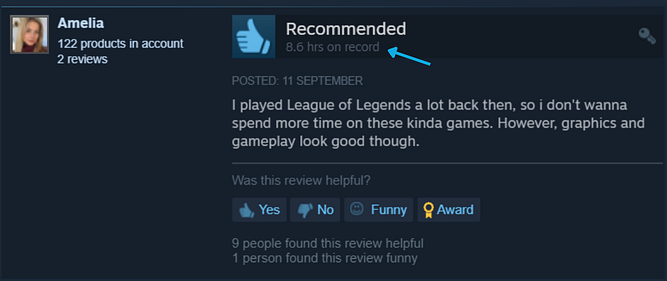
Along with each review, it notes how much time users spent playing the game. This gives others a good idea of how reliable the review is.
On top of that, Steam displays the number of reviews a user has left in total, as well as a list of their latest reviews.
Okay, So Is This Really The End of Fake Google Play Reviews?
As you can see, in this update, Google didn’t copy any of the other app stores.
This approach is all theirs, and it should be good news for the developers.
We can expect that fake Google Play reviews and review bombing will lose their power. If they get discovered in time, they won’t be able to affect an app’s reputation.
However, we don’t think this will completely eliminate fake Google Play reviews.
Want to stay up to date and read more articles like this one? Subscribe to our newsletter!

